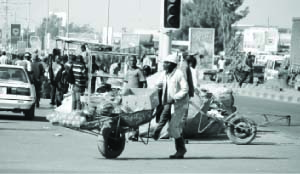
IT’s business as usual right under the traffic lights of Lusaka’s Lumumba Road. Picture by SAM PHIRI.
By SAM PHIRI –
IT is a lucid fact that the capital city of Zambia, Lusaka has become less organised, dirty and unregulated such that one does not even need to ask questions as to who is not doing what.
Not delving into fault-finding details, just take a casual walk along one of Lusaka’s prime avenues- Cairo Road and regret you did when an unbearable nose pinching urine stench from trees greets you.
Most of these trees have become ‘urinals’- an alternative especially for hundreds of male street vendors who would not want to spend a single coin on fee-paying lavatories from their daily earnings.
To be exact, trees standing opposite Ambia House on Cairo Road are the regularly used ‘urinals’ to an extent of burning-dead the grass around the trees with concentrated urea. The sight is pathetic to say the least!
Those who have found trading space close to this place have confessed that they are slowly moving metres away because even they too cannot bear the stench.
This is Cairo Road; the once upon-a-time cleanest road in town.
Some men are sometimes seen urinating on trees planted on islands of Cairo road during the day and no one seems to care.
Take a turn to Kafue roundabout onto the Independence Avenue opposite Zambia’s tallest building, Findeco House and see another dismal filthy trading arrangement that can be mistaken for an abandoned temporal refugee camp.
This is another prime area in the city that has a myriad of dirty looking makeshift stalls countering with the building on the opposite side of the road at the flyover bridge.
It has also been discovered that the makeshift structures are turned into hideouts for criminals and sleeping places for the homeless, especially in the night.
Other people use the stalls as sex hideouts in the night.
Apart from the glaring litter, one wonders what would happen to lives if these highly combustible wood and plastic made structures caught fire.
President Michael Sata comment that street vending be allowed seems to have been misunderstood because according to the declaration, no one was given powers to indiscriminately construct makeshifts stalls around town that have now become tax-free trading zones.
This is disadvantaging other legally constructed shops as these traders have erected their makeshift stalls in front of other shops.
Some of them have even put notices of blocking anyone who would want to go past through their makeshifts to the other shops.
This is simply telling any would-be client that it’s them first or get a hassle of going round the imaginable huge chain of makeshifts before accessing other shops.
Makeshifts owners do not even remit to the Zambia Revenue Authority (ZRA) but the other ‘blocked’ shops do, such that closure is definite if they do not.
In fact, the makeshift owners generate a lot of waste that finds itself in one of the major city’s drainages – the Bombay drainage.
With such disorderliness, it is no longer strange to find filthy streets as no one of the street traders is paid to keep their trading slots clean after all. The obvious inadequate manpower for the Lusaka City Council can do just as much.
With the inadequacy of manpower against the massive refuse generation per day, LCC has failed to maintain the city clean not to talk about the health aspect.
The waste generated by the street traders alone is clearly beyond the local authority’s capacity even though LCC acting public relations manager Mulunda Haabenzu shockingly refutes this fact.
“It’s not that we have less manpower or what to use for clean up. It is just that people who generate this garbage are so irresponsible. It should not start with the council but individuals,” he says.
Mr Haabenzu further claims ignorance of the structures that are actually along the same road leading to his office-the Lusaka Civic Centre.
“I am not sure about those structures … and if indeed they are there, I have to ask the LCC director of planning to ascertain their legality,” he says.
Conversely, Local Government and Housing Minister, Emmanuel Chenda has apparently seen these illegal structures.
He says they are a huge mess and LCC should provide answers and solutions as to why such disorderliness should be allowed to go on in the capital city.
“I saw those structures when I was going to Kafue…they are an eyesore and LCC who are the owners of the city must be put to task over this because that is someone’s piece of land if I am not mistaken… these are things that should not be tolerable,” he says.
The fact of the matter is that there is absolutely no regulation of the Lusaka City’s cleanliness and order of doing garbage-generating businesses.
This is why most traders have resorted to pushing refuse into the nearest drainages causing yet another impending problem that might be making headlines in the rainy season- floods.
From the same, crowded, busy business slots with unsanitary conditions, perishable food is cooked and sold in open air.
One would wonder as to why the law on hygiene and trading certificates will only pursue those that do their food business from designated places.
Food sold from such open places would range from roasted pork, chicken trotters, heads, intestines and goat meat.
This has proved a cheap delicacy especially for the street traders call boys and bus drivers but with a hidden health peril.
These are lucidly seen facts that do not even need the Local Authority to neither confirm nor deny.
With these facts, a question that begs for an urgent answer would arise : has the keep Zambia Clean and Healthy campaign died a natural death?






